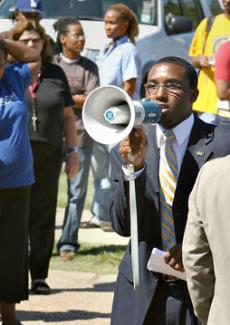
SGA President Niiobli Armah tries to rally students sitting in front of T.T. Allain Hall during the Student Violence Awarness March on September 20. Armah and other student leaders organized the march in response to a shooting across the street from campus during a football game in early September.
While attending college, some students decide to lay low and focus more on academics, while others prefer to lead the pact and leave their mark on the university.
“I decided to join the Association of Women Students and other organizations because my freshman year I was told if you ever have a problem with something on-campus, get involved,” said Allecyn Gay, a senior liberal arts major from Atlanta and president of AWS at Southern University.
In addition to maintaining a certain grade point average, attending class and having a social life, student leaders must also spear head events, delegate positions and sustain an overall goal for their organization throughout the school year.
Planners, calendars and entrusting officers to hold up their end of the bargain are just a few ways individuals keep track of what, when and where happenings occur within their respective organizations.
“Being able to deal with the different fronts that I am fronting on has to be the hardest task with being a student leader and being a student,” said Niiobli Armah, president of SU’s Student Government Association. “I have to deal with faculty, administrators and I have to answer to students.
“With those combined, that’s what makes the job difficult,” he said.
“My school work is not affected by it because I prioritize,” Armah said. “It has been times while in class that administrators, or sometimes even people in SGA, expect me to run out of class and do something and not take in consideration that I’m a full-time graduating senior.”
Time management and assigning responsibilities can be the biggest problem for student leaders here at Southern.
Deion Dorsett, a senior economics major from Baton Rouge and SGA vice president, said having so many ideas and commitments to honor can definitely make things hard to balance.
“Delegating responsibility more often in any leadership position is sometimes hard for me to do,” Dorsett said. “Whenever I go about my duties I want to be hands on because being hands on assures students that I did everything in my power to make it happen.
“I had to learn to trust my staff that I handed it down to and trust myself as well,” he said. “Sometimes it has to be a trade off.”
Besides time management and other problems, Dorsett said leaders have run into problems with administrators not taking them serious when work needs to be done.
Something he experienced first-hand when faculty members tried to devalue him and his position by addressing him as a child in addition to not wanting to help him with things that needed to be done.
“They thought the work of SGA was just a club and they don’t see the significance behind the work,” Dorsett said. “So I took it upon myself and started giving presentations, letting them knew whether you want to or not, you will have to deal with me.
“If not I’ll take it to the next level and you’ll have to answer to your supervisor,” he said. “Since then people have become more courteous and friendly. I just remembered to preserve through it all.”
Although things seem hard at times, the saying goes, “the just has to justify the means and usually the satisfaction will come after a successful program.”
“The biggest satisfaction will be come when one day one of my kids will come here and they will be able to come here and receive the benefits of hard work that was done years before,” Dorsett said. “I would know I made a difference somewhere that a transformation occurred, and hearing the confidence of students that they will send their kids here rather than I am leaving here after graduation and never looking back.”